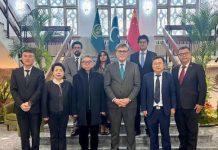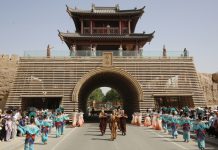BEIJING: The recently-signed U.S. appropriations bill incorporates the so-called “Taiwan Assurance Act of 2020,” which has seriously violated the one-China principle and grossly interfered in China’s internal affairs.
The Taiwan question concerns China’s sovereignty and territorial integrity. It is purely China’s internal affair and allows no interference by any external forces. Thus, it is not up to the absurd Taiwan-related act or those behind the legislation to offer assurance to Taiwan’s future.
The name of the act is intentionally misleading. On the pretext of “assuring” Taiwan, the real intention of those U.S. politicians behind the act is to seek their own political and economic gains, stir up trouble between the two sides of the Taiwan Strait, and continue their interference in China’s internal affairs and thereby contain China’s development.
For starters, the bill said “the United States should conduct regular sales and transfers of defense articles to Taiwan.” Yet, instead of assuring Taiwan’s security, the purpose of the section is to urge “Taiwan to increase its defense spending,” as clearly stated in the act.
Taiwan was reportedly the largest customer of U.S. arms in 2020. The region has spent roughly 11.8 billion U.S. dollars on purchasing U.S. weapons since the beginning of this year, according to media reports, which means that the arms have cost each of Taiwan’s residents more than 500 U.S. dollars.
Worse, the U.S. arms sales to Taiwan will send wrong signals to separatist forces who are boasting of “Taiwan independence” to resist reunification with a military buildup. Such a move cannot assure Taiwan’s security, but will seriously undermine the peace and stability across the Taiwan Strait, and push the people on the island into a dangerous situation.
Also, though the bill seems to help Taiwan participate in the events of international organizations, it, in fact, cannot assure the “international space” expected by the Taiwan authorities.
Take the World Health Assembly (WHA) as an example. In November, the WHA announced its decision not to include a proposal to make Taiwan an observer in the conference’s agenda. –PNP






